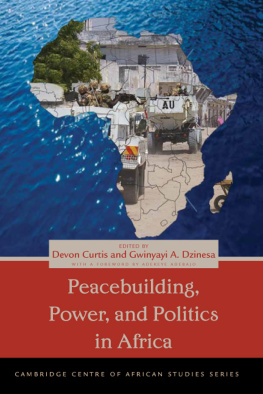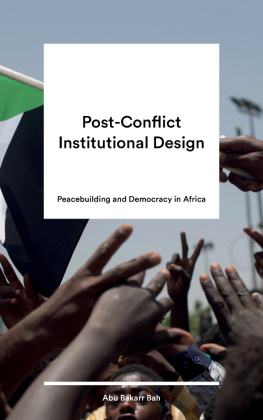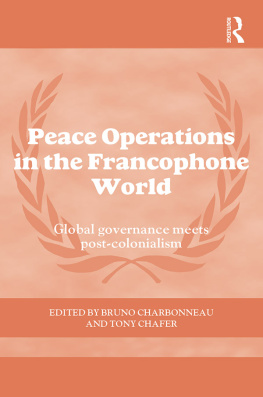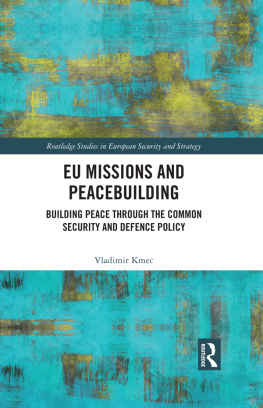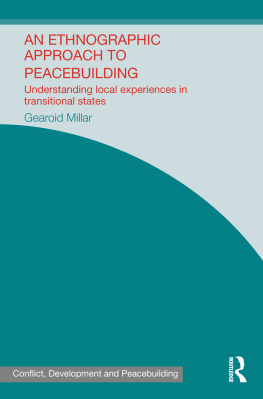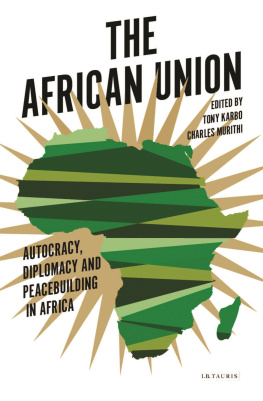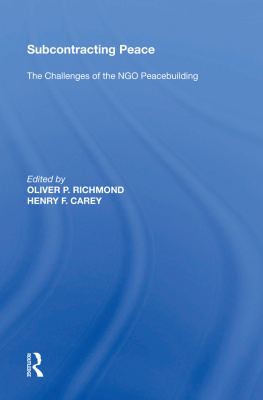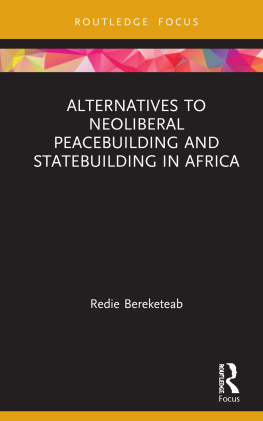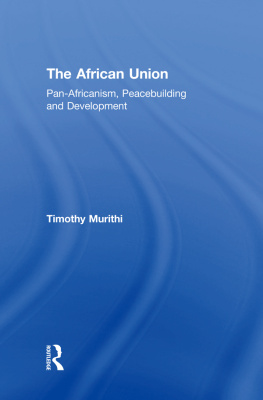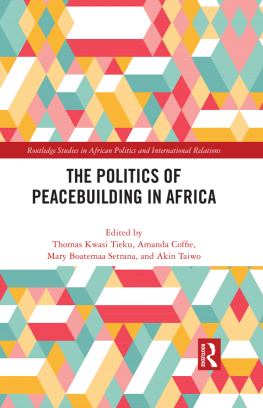Peacebuilding, Power, and Politics in Africa
CAMBRIDGE CENTRE OF AFRICAN STUDIES SERIES
Series editors: Derek R. Peterson, Harri Englund, and Christopher Warnes
The University of Cambridge is home to one of the worlds leading centers of African studies. It organizes conferences, runs a weekly seminar series, hosts a specialist library, coordinates advanced graduate studies, and facilitates research by Cambridge- and Africa-based academics. The Cambridge Centre of African Studies Series publishes work that emanates from this rich intellectual life. The series fosters dialogue across a broad range of disciplines in African studies and between scholars based in Africa and elsewhere.
Derek R. Peterson, ed.
Abolitionism and Imperialism in Britain, Africa, and the Atlantic
Harri Englund, ed.
Christianity and Public Culture in Africa
Devon Curtis and Gwinyayi A. Dzinesa, eds.
Peacebuilding, Power, and Politics in Africa
Peacebuilding, Power,
and Politics in Africa
Edited by Devon Curtis and Gwinyayi A. Dzinesa
Foreword by Adekeye Adebajo
Ohio University Press Athens
Ohio University Press, Athens, Ohio 45701
ohioswallow.com
2012 by Ohio University Press
All rights reserved
To obtain permission to quote, reprint, or otherwise reproduce or distribute material from Ohio University Press publications, please contact our rights and permissions department at (740) 593-1154 or (740) 593-4536 (fax).
Printed in the United States of America
Ohio University Press books are printed on acid-free paper

20 19 18 17 16 15 14 13 12 5 4 3 2 1
Library of Congress Cataloging-in-Publication Data
Peacebuilding, power, and politics in Africa / edited by Devon Curtis and Gwinyayi
A. Dzinesa ; foreword by Adekeye Adebajo.
p. cm. (Cambridge Centre of African Studies series)
Includes bibliographical references and index.
ISBN 978-0-8214-2013-3 (pb : alk. paper) ISBN 978-0-8214-4432-0 (electronic)
1. Peace-buildingAfrica. 2. Peace-buildingAfricaInternational cooperation. 3. AfricaPolitics and government1960I. Curtis, Devon. II. Dzinesa, Gwinyayi Albert. III. Series: Cambridge Centre of African Studies series.
JZ5584.A35P44 2012
327.172096dc23
2012019442
Contents
Foreword
ADEKEYE ADEBAJO
INTRODUCTION
The Contested Politics of Peacebuilding in Africa
DEVON CURTIS
ONE
Peace as an Incentive for War
DAVID KEEN
TWO
Statebuilding and Governance
The Conundrums of Legitimacy and Local Ownership
DOMINIK ZAUM
THREE
Security Sector Governance and Peacebuilding
EBOE HUTCHFUL
FOUR
The Limits of Disarmament, Demobilization, and Reintegration
PAUL OMACH
FIVE
The Role of the African Union, New Partnership for Africas Development, and African Development Bank in Postconflict Reconstruction and Peacebuilding
GILBERT M. KHADIAGALA
SIX
Peacebuilding as Governance
The Case of the Pan-African Ministers Conference for Public and Civil Service
CHRIS LANDSBERG
SEVEN
The United Nations Peacebuilding Commission
Problems and Prospects
FUNMI OLONISAKIN AND EKA IKPE
EIGHT
Financing Peace?
The World Bank, Reconstruction, and Liberal Peacebuilding
GRAHAM HARRISON
NINE
The International Criminal Court
A Peacebuilder in Africa?
SARAH NOUWEN
TEN
The Politics of Negotiating Peace in Sudan
SHARATH SRINIVASAN
ELEVEN
Peacebuilding in the Great Lakes Region of Africa
REN LEMARCHAND
TWELVE
Peacebuilding through Statebuilding in West Africa?
The Cases of Sierra Leone and Liberia
COMFORT ERO
THIRTEEN
Oil and Peacebuilding in the Niger Delta
ADEROJU OYEFUSI
FOURTEEN
Disarmament, Demobilization, and Reintegration in Southern Africa
Namibia, Angola, and Mozambique
GWINYAYI A. DZINESA
FIFTEEN
Peacebuilding without a State
The Somali Experience
CHRISTOPHER CLAPHAM
Foreword
ADEKEYE ADEBAJO
Executive Director, Centre for Conflict Resolution, Cape Town, South Africa
It was fortuitous that, after five years, I was able to take time out from my position as the executive director of the Centre for Conflict Resolution (CCR), in Cape Town, South Africa, in 2008/9 to spend a five-month sabbatical in the wonderful surroundings of the Centre of African Studies (CAS) at Cambridge University in England. In pursuit of its pan-African vision, the overall theme of CCRs Africa program in 200812 was Peacebuilding in Africa, with a book planned specifically to assess the continents peacebuilding challenges. Under the dynamic supervision of Devon Curtis, CAS was itself preparing a book project on the same topic. This volume is the result of the fruitful marriage of both projects between an African institution and a European institution, involving scholars from Africa, Europe, and North America, as well as an Indian-Australian scholar. Several of the authors have practical experience of peacebuilding in Africa. Thematic debates involving issues of mediation, governance, the security sector, disarmament, and demobilization are combined here with assessments of African and global institutions, bolstered by rich case studies spanning the Great Lakes region, Southern Africa, West Africa, and the Horn of Africa. This is truly a unique volume, which we hope scholars, civil society activists, and practitioners around the world working on peacebuilding issues in Africa will find useful.
A seminar at the University of Cambridge in March 2009 helped shape the conceptual and empirical contents of this project. Five months later, CCR organized and largely funded a policy seminar in Gaborone, in cooperation with the universities of Botswana and Cambridge, attended by about forty scholars and practitioners. My colleagues at the Centre for Conflict Resolution deserve particular praise for the flawless organization of this logistically challenging meeting. Commissioned papers were presented at the seminar over three days, and authors received feedback to revise their chapters in a rigorous editing process. A few more chapters were commissioned based on gaps identified at the Gaborone seminar. We thank all the authors for cooperating so efficiently with this arduous process. I particularly acknowledge the contributions of Devon Curtis, who did the most to shape and edit the book (including spending a few weeks in Cape Town in 2010 completing this project). I also thank the director of CAS, Megan Vaughan, for supporting this collaboration. Devon Curtiss co-editor and former CCR colleague, Gwinyayi Dzinesa, also deserves recognition for his contributions. I take this opportunity to pay tribute to Glenn Cowley, former publisher of the University of KwaZulu-Natal Press, with whom CCR published seven important books on Africas postCold War international relations. At the Gaborone seminar in August 2009, he skillfully chaired a session on how to turn the papers into a coherent edited volume. Glenn unfortunately died in May 2011, and his great warmth, experience, and insights will be sorely missed.
CCR, one of the very few centers of excellence on the UNs role in Africa, has established its expertise in this important area, organizing important policy seminars since 2004 on critical peacebuilding challenges in Southern, West, Eastern, and Central Africa that involved key actors from the African Union (AU), Africas regional organizations, civil society, the UN, and external donor representatives. The center has also published three books on UN peacebuilding issues, as well as three other volumes covering issues of transitional justice in Africa, Africas human rights architecture, and the African Union and its institutions.

